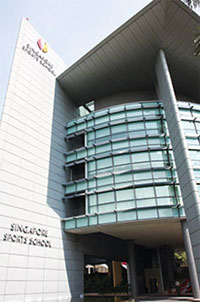 Since the Singapore Sports School (SSP) was started in 2004, specially talented youngsters have been able to juggle their studies with sports by having customised training and personalised academic support.
Since the Singapore Sports School (SSP) was started in 2004, specially talented youngsters have been able to juggle their studies with sports by having customised training and personalised academic support.
The Sports School, which is less than ten years old, has already chalked up an impressive record. 246 of its athletes and alumni have already represented Singapore in competitions as prestigious as the Olympic, Youth Olympic, Commonwealth, Asian and SEA Games. Besides its medal tally in both regional and international competitions it has now produced a Public Service Commission Overseas Merit Scholar as well and plans to introduce the International Baccalaureate diploma programme for its older student-athletes soon.
Sports School's Brand of Holistic Education
"Philosophically, Singapore Sports School is more akin to our European counterparts. The outstanding education that we provide offers a combination of academic rigour and comprehensive sports training that is well supported by our sports science practitioners," said Principal Mrs Deborah Tan.
Indeed, the School's Performance Enhancement Institute boasts a whole range of sports science specialists who are variously trained in physiology, physiotherapy, psychology, biomechanics, strength and conditioning, and sports technology. Between them they underpin the most important areas of the school's athletic grooming by helping to identify young talent, devising all round fitness and ability programmes, and providing evidence-based tests and support for individual athletes in both training and competition. There is no equivalent to the range and depth of this expertise anywhere else in Singapore's educational landscape.
But another thread in both sport and studies at the School is the emphasis on personal excellence. "Without a doubt we prize talent but we also prize all the other attributes that can help these youngsters realise their full potential," Mrs Tan said.
Values are not just taught. They are naturally developed in the School. This is because there are many opportunities for its students to learn about themselves and others as they study, train, compete and live together. Such an all-inclusive environment is especially able to foster and monitor personal growth so that its young athletes also become capable young people and young leaders.
The School thus offers a broad range of educational experiences and seeks to produce both knowledgeable students who are independent learners, and thoughtful team-players who are also capable of being leaders. As Mrs Tan points out, "The uniqueness of our brand of holistic education is well-captured in our motto: grooming learned champions with character."
Integration and Flexible Delivery of Sports and Academic Curriculum
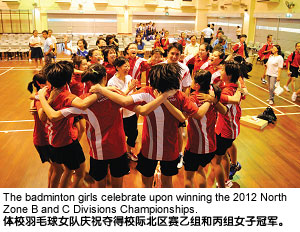 Nurturing young athletes has its problems, especially when it comes to balancing their academic needs with their sporting ones. Each year the Head Coaches of the various sport academies will draw up an annual training and competition plan but if any of their student-athletes are subsequently drafted into a national squad then SSP will sit down with the relevant National Sports Association to harmonise these students' schedules. It is therefore incumbent on the academic staff at the School to work very closely with all the students who, to a certain extent, have unusual commitments outside the classroom. This is particularly the case when young athletes are involved in training or competitions that take place overseas. Nurturing young athletes has its problems, especially when it comes to balancing their academic needs with their sporting ones. Each year the Head Coaches of the various sport academies will draw up an annual training and competition plan but if any of their student-athletes are subsequently drafted into a national squad then SSP will sit down with the relevant National Sports Association to harmonise these students' schedules. It is therefore incumbent on the academic staff at the School to work very closely with all the students who, to a certain extent, have unusual commitments outside the classroom. This is particularly the case when young athletes are involved in training or competitions that take place overseas.
Even more personalised support is given to those athletes who are especially successful and who can therefore be away from school for months at a time. A good example of such a case is Isabelle Li, who was the silver medallist in Table Tennis at the 2010 Youth Olympics and who now has her sights set on the 2016 Games in Rio de Janeiro. In the run up to the 2010 YOG Isabelle spent roughly six months abroad every year, either for training or for competitions. Clarence Chew and Tay Chi Kiat were similarly affected. It was therefore very necessary that the academic department at SSP worked extremely closely with the Singapore Table Tennis Association to provide highly customised support for these three young paddlers.
Extended and Multiple Academic Pathways for Student-Athletes
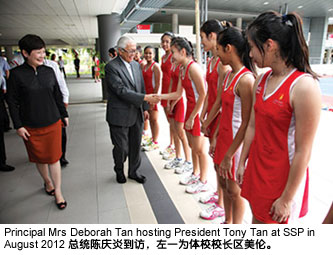 When the School first started it offered only secondary education to its student-athletes, but it soon became evident to its founding Principal, Mr Moo Soon Chong, that this was not going to be enough. Research and experience both showed that, with exceptions, an athlete is rarely at his or her peak until at least their mid or late teens. This meant that the academic pathway at SSP needed to be extended, and quickly, to take account of the longer maturation period of sporting accomplishments. When the School first started it offered only secondary education to its student-athletes, but it soon became evident to its founding Principal, Mr Moo Soon Chong, that this was not going to be enough. Research and experience both showed that, with exceptions, an athlete is rarely at his or her peak until at least their mid or late teens. This meant that the academic pathway at SSP needed to be extended, and quickly, to take account of the longer maturation period of sporting accomplishments.
The first answer to this challenge resulted in a collaboration with the Auckland University of Technology (AUT) and the East Asia Institute of Management to offer a two-year Diploma in Sports Management and Exercise Science. The Diploma was taught at the SSP campus and was offered from 2007 to 2010.
This route proved popular with many of the School's outstanding student-athletes at the time. Olympians Tao Li, Calvin Kang, Dipna Lim-Prasad and Mylene Ong; and national athletes, bowler Jazreel Tan, sailor Sherman Cheng, jumper Stephen Tseng, swimmers Amanda Lim and Clement Lim, badminton shuttler Jeffrey Wong and golfer Gregory Foo, are amongst its distinguished alumni. A significant number of AUT diploma graduates are now pursuing a Sport Science and Management Degree in Nanyang University of Technology (NTU) while others have proceeded to overseas destinations like Monash University, the University of Western Australia and several US colleges for their tertiary studies.
The AUT Diploma programme in SSP was a model of an athlete-friendly academic set-up that nurtured many national athletes. It also paved the way for its successor which is arguably even more of a good fit. This is the customised Republic Polytechnic (RP)-SSP Diploma in Sports and Leisure Management programme which offered its first enrolment in 2011, the same year that the AUT Diploma programme saw its last graduating cohort. A big boost to the new programme was given when NTU committed itself to accept outstanding Sports School-Republic Poly graduates who are national or national age-group representatives, under its discretionary admission criteria. So currently, SSP student-athletes can continue to realise their sporting potential to the fullest without having to sacrifice their academic aspirations.
Another big step forward has been taken more recently. As from 1 September 2012 SSP was officially recognised as an International Baccalaureate (IB) school for the Diploma Programme (DP) which, it is hoped, will commence in January 2014. And in order that younger, academically able students can progress easily to the IB Diploma, SSP has already developed an Honours Programme for years 1 and 2 and a Pre-IBDP Programme for years 3 and 4.
The six-year IBDP through-train pathway will mean that, for the first time, suitable student-athletes will be able to pursue sporting and academic excellence concurrently, and when they graduate they will have a broad-based, rigorous and widely accepted pre-tertiary qualification that gives them access to reputable universities world-wide.
Yet Another Innovation: "School-within a-School"
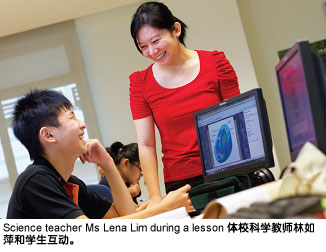 In 2011, the School went a step further to enhance the training of a select group of student-athletes who had been drafted into national youth or senior teams. Instead of waiting for lessons to end to start their training, these youngsters start their day with training and have their lessons afterwards, in the evening. In 2011, the School went a step further to enhance the training of a select group of student-athletes who had been drafted into national youth or senior teams. Instead of waiting for lessons to end to start their training, these youngsters start their day with training and have their lessons afterwards, in the evening.
Called the "School-within-a-School" programme, the aim is to optimise their training potential in the hope that some of them will break into the top 100 world rankings by 2015, Mrs Tan explained.
Research has shown that most athletes function optimally in the mornings. Responding to this fact, which has especial relevance for sports like table tennis and badminton where training intensity and volume are required to attain high performance standards, SSP in partnership with the respective National Sports Associations, decided to modify the training schedule for a select group of student-athletes. "The SWS programme as an innovation stemmed from our commitment to nurture talented athletes without minimising academic aspirations and is based on sound practice observed in other systems," said Mrs Tan, adding, "intermediate achievement milestones include finishing eighth or better in major international youth tournaments."
The selected student-athletes come from the table tennis, badminton and golf academies. They train from 8.30 to 11 am, break for lunch and a rest, and then resume training again from 2 to 4 pm. Academic classes start at 5 pm and end at 9.40 pm. This arrangement is beneficial for golf, not because of the physical demands of the sport but because it allows the young golfers to play full 18-hole practice rounds in the mornings.
With a small number of student-athletes on the programme currently, the evening classes are organised with subject teachers attending to two to three student-athletes from different levels. This allows close monitoring and ensures that each student receives special attention from his or her teachers.
The School has already seen positive results in the sporting performance of the student-athletes in the programme. Marc Ong and Nicklaus Chiam from golf, and Yee Herng Hwee from table tennis are notable examples. These students have catapulted into their respective national squads and earned themselves a number of accolades. Marc was the youngest Singaporean golfer at the Laos SEA Games in 2011 whilst Nicklaus joined the national ranks soon after. And for her part, Herng Hwee helped the women's table tennis team to win a silver medal at the recent SEA Championships at Vientianne in Laos.
Have their studies been adversely impacted? Well, so far all the student-athletes on the programme have either maintained or improved on their academic performance.
Student-Athlete Support
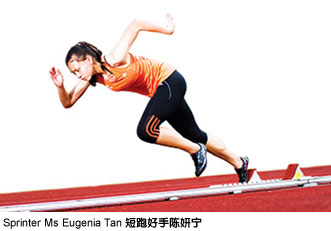 Because of their rigorous training and academic schedules, the residential programme in the School provides comprehensive support to student-athletes who stay in the boarding school from Sunday nights to Friday evenings. The boarding school is staffed by full-time professionals as well as staff volunteers from the School management, and academic and sports departments. Because of their rigorous training and academic schedules, the residential programme in the School provides comprehensive support to student-athletes who stay in the boarding school from Sunday nights to Friday evenings. The boarding school is staffed by full-time professionals as well as staff volunteers from the School management, and academic and sports departments.
The conducive and safe environment presents a unique and pleasant experience for its student-athletes and staff - "a home away from home". And there is a distinct camaraderie and sense of belonging to the School as a result.
With class sizes averaging 20-25 close academic monitoring of the students is possible. Moreover, the integration of lessons with sports and boarding means that the youngsters receive continual feedback, which is always done in a spirit of care and goodwill, on their daily effort and quality of work.
"We are fully cognisant that podium finishes in sport are not always achievable. As such, we value and commend our student-athletes' daily effort at training and in their classes. We encourage them to strive for personal bests at competitions and over time, these personal best efforts may culminate in significant wins," said Mrs Tan. As a result many young athletes have learnt to increase their resilience to counter disappointments and setbacks. "They draw comfort from being in a community of fellow student-athletes and staff who understand the challenges and have support structures to encourage them."
But for those who do well there is also support of a different kind - in the send-off ceremonies that are traditionally held for student-athletes or alumni who are selected for major competitions. The alumni make every effort to attend these events regardless of their busy schedules. Mrs Tan believes that this is because of their close ties with the School and their memories of the acknowledgement given to their own achievements when they were students there. These ceremonies have been and continue to be a real source of inspiration and motivation for staff, student-athletes and alumni alike.
Sports School Graduates Do Well
Because the School is necessarily geared towards selecting and nurturing students with exceptional sporting talent it is no small feat when 65 per cent of its graduates go on to university, either at home or abroad. This is at the same time that its pipeline of national athletes at either youth or senior level has swelled to 246.
SSP graduates who continue to pursue their passion for sports whilst majoring in sport-science and sports management degrees at NTU and overseas will be Singapore's champions and stalwarts throughout their professional careers.
However, an even larger number of SSP graduates have gone on to pursue a wide and impressive range of tertiary degrees outside of those subjects related to sports. These include Accounting, Arts and Social Sciences, Biomedical Sciences, Business Studies, Computer Engineering, Economics, Engineering, Law, Mathematics, Podiatry, Pre-Medicine, Shipping Management, and Sequential Art.
Topping the list is graduate Scott Ang who represented Singapore in Triathlon at the Singapore 2010 Youth Olympic Games and won an SAF Overseas Scholarship last year, one of the prestigious Public Service Commission Scholarships. He will read Law at the University of Cambridge.
Not far behind are sailor Sean Lee and paddler Tan Hui Min who were both recipients of the Lee Kuan Yew Award for Mathematics and Science. Sean has been offered a Nanyang Scholarship and will pursue a double degree in Accountancy and Finance at NTU. Hui Min is now reading Computer Engineering on a scholarship at NTU.
Two swimmers have also excelled academically. Amanda Lim has been offered an NCAA scholarship at the University of Florida to pursue swimming and premedicine, and Pang Si Jia, who was awarded the University of Idaho Sports Scholarship, graduated in December 2011 with a top-ten Bachelor of Science Degree in Accounting and is currently pursuing her Master's in the same subject.
The Place of SSP in the Landscape of Singapore Education
"Singapore Sports School has a special place in Singapore's education system. We are uniquely student-athlete centric with a set-up and resources that enable a good balance between sports and studies. We have a thoughtfully integrated academic and sports programme with the capability for flexible delivery in a nurturing environment that allows full access to world-class training facilities," said Mrs Tan.
The Sports School is therefore uniquely equipped to fully maximise a student's potential and to provide him or her with solid academic support. This is something mainstream schools may be hard-pressed to rival because of their resource constraints and lack of expertise. In addition, the school firmly believes in developing student athletes with sound values through a holistic and wellrounded education.
If a student wishes to excel in both sports and studies, the Sports School certainly seems the best place to do so.
|